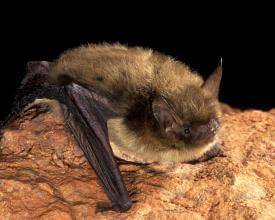DHA eNews - Legislators Push For Commonsense Regulation
As the current Congress and 2022 come to an end, key Republican leaders in the House of Representatives are attempting to cut the funding to list the northern long-eared bat as endangered in the end-of-year funding package. Although the effort is unlikely to be successful, it does draw attention to the challenges the listing could pose for forest products producers and the thousands of communities and families that depend on them. Early next year, the U.S. Fish and Wildlife Service is expected to approve the Lake States Region Bat Habitat Conservation Plans (see story below). Hopefully, these plans will provide regulatory certainty and a commonsense approach that allows timber harvest—which is not what threatens the bat population.
If not, raw material supplies could be further reduced at a time when we are also seeing more forestland restricted from harvest due to carbon offsets. A multinational financial corporation, Manulife, has announced plans to enter the forest carbon-offset market. This big announcement follows recent announcements by a global investment firm, Oak Hill Advisors, which recently paid $1.8 billion for 1.7 million acres of hardwood forests where it plans to harvest offsets instead of allowing the harvest of timber.
If you have questions or comments, contact me. I look forward to hearing from you.
I hope you enjoy the holidays. Here's to a happy and successful New Year!

Keith A. Christman, President
Decorative Hardwoods Association
Photo © J. Scott Altenbach

As reported in our last eNews, the U.S. Fish and Wildlife Service recently reclassified the northern long-eared bat as an endangered species. Last week, more than 20 members of Congress, including the ranking member of the House Committee on Natural Resources, officially requested that no funds be allocated to enable the reclassification of the bat from threatened to endangered.
In addition, we have learned that USFWS is likely to approve the Lake States Region Bat Habitat Conservation Plans in January. These plans allow incidental take permits for state and private landowners, meaning that those who opt into the conservation plans, which are designed to minimize the impact on the bat, could conduct forest management activities.
Another investment firm will be entering the carbon-offset market with the likely goal of reducing timber harvests. Manulife, the largest timberland investment management organization in the world, will raise a $500 million fund for this project. Manulife already manages about 6 million acres of forestland.
A new law to combat deforestation has been agreed upon by the European Parliament and Council of the European Union. Once adopted and applied, the new law is designed to ensure that goods that enter the EU market will no longer contribute to deforestation and forest degradation in the EU and elsewhere in the world. However, the law would require unworkable geolocation that the American Hardwood Export Council and others have opposed.
Kitchen cabinet sales are still up by 17.3% year-to-date vs. last year, although October sales were down by 6.7% vs. September.
A few of Zillow's predictions for the 2023 housing market: affordability will improve, the Midwest will become a hot market, more families and even friends will combine resources to buy homes, more new rentals will be built, and people who bought second homes during the pandemic may now become landlords.
September furniture orders fell by 26% vs. last September, with year-to-date orders down by 29%. Shipments of furniture, however, continued to grow as companies worked to fill large backlogs. Jobs and employment are still stable.
The November action by CITES, the Center on International Trade in Endangered Species, includes a set of new requirements for Khaya, also known as African mahogany. The changes will go into effect on February 23 and require re-export documentation to be sent from the country of origin.
Earthsight investigators say that they have connected the use of forced prison labor to furniture sold at nearly every major furniture retail chain in Europe, including IKEA, BUT, and XXXLutz, and that IKEA furniture linked to forced labor has been sold in the U.S.
The U.S. Forest Service will form a new federal advisory board to provide input on the Northwest Forest Plan, which covers Northern California, Oregon, and Washington. Nominations for the advisory committee must be submitted by January 17. The group will consist of 20 diverse members from all three states, including scientists, organizations with an interest in the forests, and government, tribal, and public groups.
The U.S. Forest Service may submit a plan to cut trees on about 11,000 acres of Vermont's Green Mountain National Forest. The plan is already causing friction between climate advocates and federal officials. Climate advocates are protesting the plan, while federal officials argue that logging will benefit the forest.
Resolute Forest Products of Canada has further expanded the use of drones to include mapping and aerial seeding in Ontario. The company says that they are just scratching the surface of what the forestry industry can accomplish with drones.
In the 1900s, billions of U.S. chestnut trees died from a fungus introduced by Japanese chestnut stock. The U.S. Department of Agriculture has released a proposal that will allow the planting of blight-tolerant genetically engineered chestnut trees, which is drawing opposition.
A project to prevent catastrophic wildfires in the Bass River State Forest, a federally protected forest in New Jersey, would involve cutting down up to 2.4 million trees.
Eight Canadian environmental groups have filed an official complaint claiming that the SFI, the Sustainable Forestry Initiative certification organization, has made "false and misleading" claims about sustainability. The executive director of an environmental law firm states that SFI doesn't "confirm sustainability."
What is the fastest-growing hardwood tree in the world?





